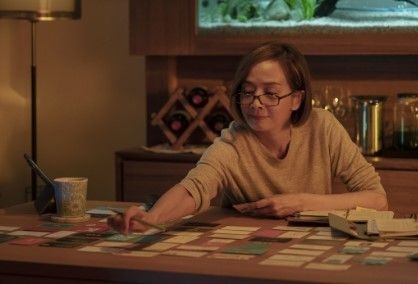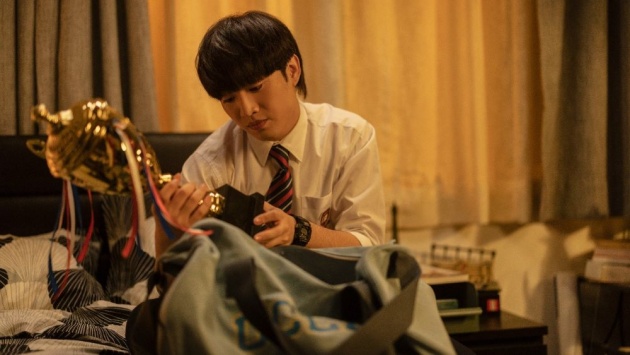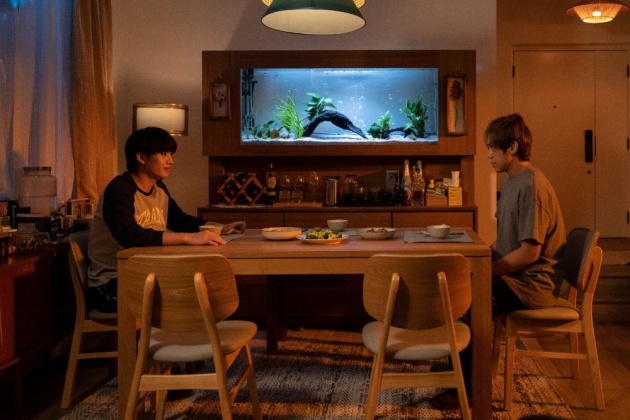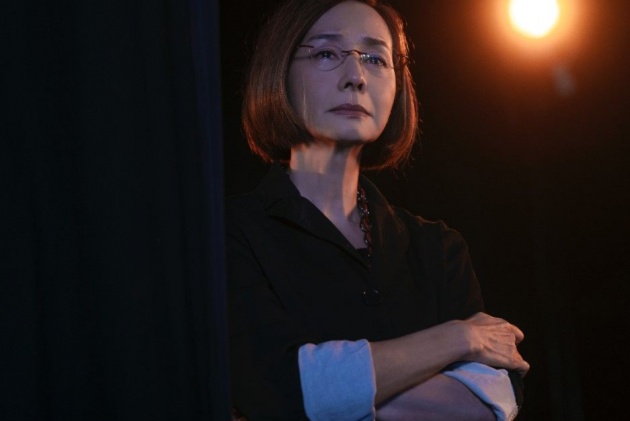
Pictured: Mei-Fung (Teresa Mo) makes plans for young singer Fong Ching (Keung To) in the Hong Kong music-driven melodrama, 'Mama's Affair', written and directed by Kearan Pang. Still courtesy of Emperor Motion Pictures (HK) / Cine Asia (UK)
Mention Hong Kong cinema to many cinemagoers and they might think of action films, particularly the work of John Woo, Johnny To and, in a lighter vein, Stephen Chow, or else the arthouse romances directed by Wong Kar-Wai. They won’t necessarily cite a melodrama featuring two members of the Cantopop boy band, ‘Mirror’. The latter is Mama’s Affair, written and directed by Kearan Pang (29 + 1) which tells the story of a woman, Mei-Fung (Teresa Mo) undergoing a shameful divorce who takes on as a protégé, Fong Ching (Keung To) a charming waiter from a local café, much to the annoyance of her seventeen-year-old son, Hin (Jer Lau). This is a generic but enjoyable and unexpectedly moving drama about following your talent and second chances. For Fong Ching, it is about having a mother for the first time in years, someone who he trusts and honours. Hin, by contrast, hides his true self from his mother, ostensibly planning to study at Cambridge University, England to be an architect. He has a flair for the theatrical, winning a trophy with ribbons for his High School show, ‘Future Future’ (for which he is billed as Jonathan Lo – confusing, but no matter). However (somewhat unrealistically), his mother doesn’t go into his room to check out his silverware collection.

Pictured: Hin (Jer Lau) contemplates his trophy in a scene from the Canto-pop melodrama, 'Mama's Affair', written and directed by Kearan Pang. Still courtesy of Emperor Motion Pictures (HK) / Cine Asia (UK)
Before she became a devoted wife and mother – as the latter, insisting on feeding Hin and driving him to school, even though he would prefer that she didn’t – Mei-Fung worked for a record label. ‘You’re the Mei-Fung thanked on hundreds of records,’ she is told later on by an awestruck young person unaware that she nurtured talent. However, after working too hard and suffering a miscarriage, she gave it all up. With her son about to leave home, she takes a job in a music and dance studio for young people. During one of her first days at work, she sees a young mother bring her (by conventional standards) chubby son for piano classes. The boy is distraught. ‘I want to do dancing,’ he pleads. His mother insists that if he dances, people will laugh at him. Just at that moment, Fong Ching walks in with a delivery. ‘Just one moment,’ he tells the mother, taking the boy by the hand. ‘Have you shown your mother your moves?’ The boy shakes his head. Fong Ching takes the boy into a dance studio and asks him to follow his lead. He does so enthusiastically and with flair. His mother is impressed. ‘How do I sign up?’ she asks. Mei-Fung is more impressed by Fong Ching, whom she learns had won a singing contest and was brought up by his aunt following the death of his parents. She meets him at his place of work, asking what’s good there (Fong Ching recommends an egg cake). She mentions her connections.
Visiting her old employer, she meets a young man whom she helped achieve promotion – now he is a CEO. Mei-Fung may be outside the industry, but she still has respect. So has Kearan Pang, who served as a judge on the show King Maker III Final Competition, and clearly has boy band members in her contacts list.
First, Mei-Fung has to convince industry folk that Fong Ching can sing. She brings him to her house for Karaoke, allowing a producer to listen in as Fong Ching performs the song that won him the talent contest. A Hong Kong audience is ahead of the movie; of course, Fong Ching/Keung To carries a tune. This is what they have come to see. But what about Jer Lau? ‘I don’t sing,’ he says at one point in a self-deprecating manner. In this film, the audience get to watch him act.
Hin’s father is rarely home. When he appears, he refuses the soup that Mei-Fung has made for him. Mei-Fung’s marriage is over. As we discover later, her husband has moved in with Auntie Sarah, who Mei-Fung recommended for a job with her husband. She is now pregnant – and there’s no turning back.
As Mei-Fung brings Fong Ching to a recording studio, we might think, what about her new job? Isn’t she supposed to be helping out at the dance studio-performing arts centre? Of course, colleagues who work with Mei-Fung succumb to awe. Fong Ching records a song. His career begins.
Gradually, Hin’s schoolfriends learn that his mother is managing the growing teen sensation that Fong Ching has become. Fong Ching may have told everyone he is an orphan, but his father (Wing Cheong-Law) has been released from jail after nine years. Mr Fong was involved in a drunk driving accident that killed both Fong Ching’s mother and the other driver. Now he seeks forgiveness. Fong Ching struggles to contain his rage, but the dam of anger and pain bursts. He strikes his father and screams, ‘you took my mother away from me. I want her back.’ Fong Ching’s aunt may be pleased to welcome her brother, but Fong Ching moves out.
Mei-Fung offers Fong Ching her spare room. Hin is not thrilled, but rather simmers. His anger, when it emerges, is more focussed on his mother hiding her divorce from him. Fong Ching, by contrast, is touched by the offer of a room. ‘It is a long time since I slept in a room of my own,’ he tells her.
In the west, the veneration of Mother is not something taken for granted. In Hong Kong, respect is a given. Fong Ching’s view of Mei-Fung isn’t something western audiences are pre-disposed to take at face value. There are no Oedipal feelings here, rather a strong cultural understanding of the role that a mother plays. Fong Ching doesn’t test boundaries or seek an alternate father figure, as you might see in other cultures. Rather, he seeks to avoid cultivating the weakness and self-loathing displayed by his own father.

Pictured: 'I was a waiter,' Fong Ching (Keung To) tells his manager's son, Hin (Jer Lau) in the Canto-pop melodrama, 'Mama's Affair', written and directed by Kearan Pang. 'I can tell', Hin replies. Still courtesy of Emperor Motion Pictures (HK) / Cine Asia (UK)
Both Jer Lau and Keung To are members of the same pop band. Their on-screen rivalry is tempered by off-screen unity. They face each other over the family dining table with an aquarium in the background. Water is a signifier of female sexuality, so the aquarium is more a statement indicating the product of such sexuality, the beautiful and exotic fish inside. In Robust, the male protagonist smashes such an aquarium in an explosion of loneliness. An aquarium is also a not very subtle visual metaphor for containment. Bottling up feelings is something characters here do all too frequently.
The comedy dinner table scene, with the frisson of tension between Hin and his mother’s house guest, builds further. Hin’s friends want to study at his house, but Fong Ching is there. Hin requests that Fong Ching stays in his room, knowing that he will be the centre of attention should he make himself known. During the study session (with pizza), Hin receives a message. Fong Ching needs to use the bathroom. Hin distracts his friends by drawing their attention to a naked woman in the building opposite. They rush to look and are naturally disappointed. One of the friends says she needs to use the bathroom. Hin directs her to his mother’s en suite facility. Another friend wants to use the bathroom. ‘It must be the pizza,’ he cries. He rushes to the bathroom occupied by Fong Ching. Hin expects Fong Ching to be discovered, but the friend says nothing, instead apologising for the stink that he left behind. After they leave, Hin rushes to the bathroom and discovers Fong Ching hiding in the shower behind a curtain holding his nose.
Fong Ching’s fame builds. Hin is appalled to read in magazine details of his mother’s divorce. Why is there so much in it about his family? A restaurant meal with Mei-Fung is interrupted by fans seeking selfies. Outside there is a large group seeking pictures. Mei-Fung steps out into the road and is almost hit by a car. Fong Ching is shocked. They get into the car and speed away, but we feel the reminder of Fong Ching’s painful loss.
Plans are made for a big concert and at one point, Mei Fung stops the car to show Fong Ching the poster for his show (the English word ‘Once’ in block capitals features prominently). Fong Ching is both astounded and mesmerized. Moreover, Fong Ching receives interest from Korea. He will only go there if Mei-Fung accompanies him.
When Mei-Fung and Fong Ching meet with the Korean music company, both of them notice Mei-Fung’s ex-husband arrive at the restaurant with the aforementioned Auntie Sarah. Mei-Fung says nothing, but Fong Ching notices her discomfort. He asks to leave the table for a moment. By the end of the meeting, the couple are nowhere to be seen. Fong Ching asked them to move.

Pictured: He's on his own. Mei-Fung (Teresa Mo) watches from the wings in a scene from the Canto-pop melodrama, 'Mama's Affair', written and directed by Kearan Pang. Still courtesy of Emperor Motion Pictures (HK) / Cine Asia (UK)
Hin’s anger with his mother and with Fong Ching steadily grows. He faces the singer at the beach. When Hin mentions Fong Ching’s lack of parents, a fight ensues, a wrestling tussle between two young men carrying surplus emotions. Fong Ching mentions that he asked Mei-Fung to join him on his trip to Korea and eventually reveals that she refused. Meanwhile, Mei-Fung calls on Mr Fong and collects from him a box of unread letters, sent while he was in prison. Fong Ching is given the box, sealed with a ribbon. He opens it and cannot stop reading.
The chubby kid who followed Fong Ching’s dance lead gets two call backs, seen in the crowd during one recording, then at the climactic concert. Mei-Fung is backstage as Fong Ching prepares. Once he steps out on that stage, there will be no turning back. Though he cannot see him, he addresses his father in the crowd: ‘I hope you like what you see.’ He performs a self-penned composition. I wondered whether Fong Ching used his father’s letters as inspiration for the lyrics, but then there might be copyright issues.
In a postscript, Mei-Fung sits down next to Hin to watch a reprise of the High School ‘Future Future’ show that he directed. There is the sense that she will attend to show-business matters closer to home.
From a parental perspective, this story of pride and sacrifice resonated – I’m not sure younger viewers would be equally moved. Since its release in Hong Kong on 11 August 2022, it has grown an affectionate audience. It is now in its third week of release on UK cinemas, coasting on strong word of mouth. One reviewer described it of being of interest to fans of boybands only. I say, not so.
Reviewed at Cineworld O2 Centre, North Greenwich, London, Screen Fifteen, Tuesday 30 August 2022, 19:15 screening



